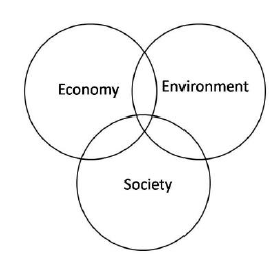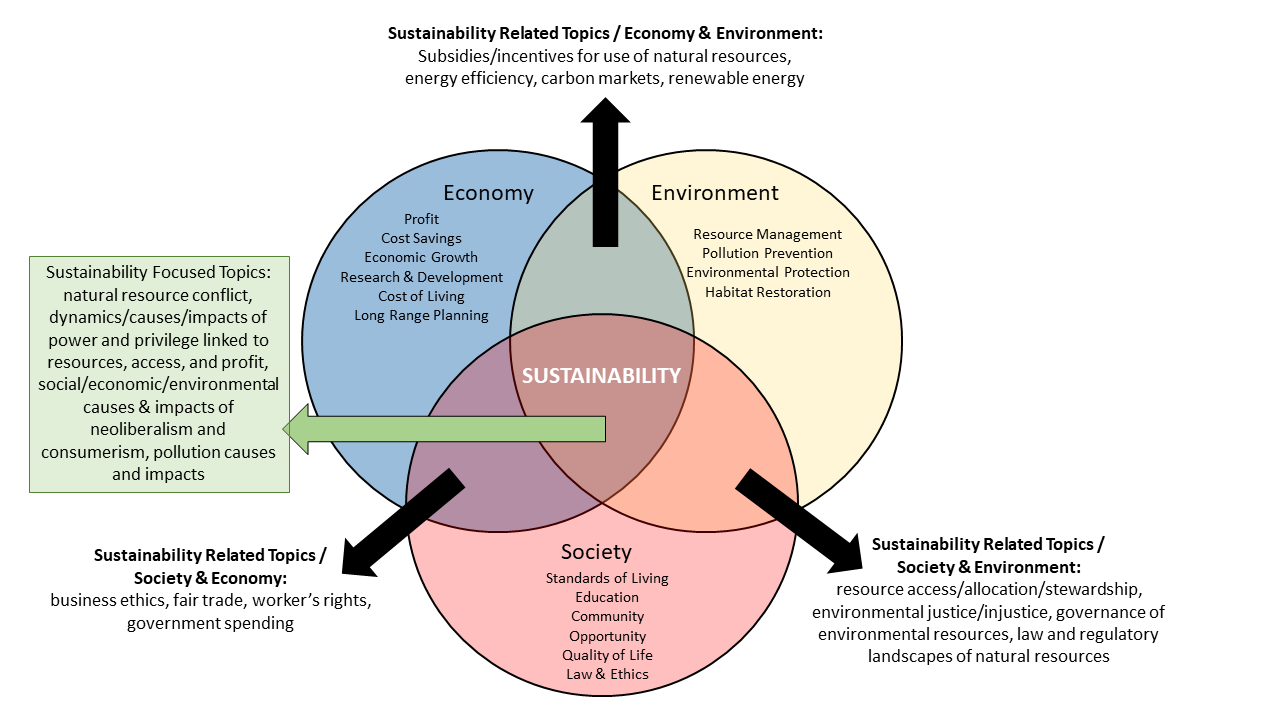Breadcrumb
Sustainability Course designations
What is sustainability?
How should scholars, researchers, and community members understand and qualify their work at Humboldt as sustainability related or sustainability focused? Here are a few guidelines and concepts that may help you make this qualification on your own. See below.
Definition:
STARS (the Sustainability Tracking Assessment and Rating System) is a well-respected and deeply vetted tool for stakeholders at institutions of higher education to understand and report on sustainability. As such, this group provides the following text when describing sustainability in their Technical Manual (2018, version 2.1, page 14):
“Popular representations of sustainability underscore the concept’s three dimensions. Sustainability experts often use a three-legged stool as a symbol for sustainability. The social, economic, and environmental components each represent one of the stool’s legs. If one of the legs is missing, the sustainability stool can’t balance or function. A common illustration of sustainability is the diagram depicting three overlapping circles representing environmental needs, economic needs, and social needs. The area where the circles overlap and all three needs are met is the area of sustainability.”

At Humboldt, this description helps us conceptualize how our research and work might fit this criteria. Further, at Humboldt, we talk about sustainability-focused research (or sustainability-focused classes or projects) as encompassing all three dimensions in some way, while sustainability-related research (or sustainability-related classes or projects) would encompass just two of the three dimensions in some way. An example of where topics and fields of study might fit within this logic path is expressed graphically in the triple venn diagram below.

To see a sampling of various classes and research projects at Humboldt and how they have been designated as either sustainability-focused or sustainability-related, review this document. To review a logic tree that may help you understand where your class or research project fits into the designation model, review this document. Take note that distinguishing between sustainability-related and focused topics is a fluid practice open to interpretation, one that does not necessarily have clear boundaries. All resources on this page are intended to give guidance and provide an overview, without making characterizations of stark correctness or accuracy.
Here is some additional text highlighting projects/content/topics that might be sustainability-related:
Sustainability-related topics with society-environment interconnections might include but are not limited to:
- food insecurity
- resource access/allocation
- Environmental justice/injustice
- Land use policy or politics
- governance of environmental resources
- Law and regulatory landscapes of natural resources
- Population, demography
Sustainability-related topics with society-economy interconnections might include but are not limited to:
- dynamics/causes/impacts of poverty
- business ethics
- fair trade
- worker's rights
- social impacts of supply chains and markets
- access to education
- causes & impacts of housing insecurity
Sustainability-related topics with economy-environment interconnections might include but are not limited to:
- Theories/analysis of economic development
- Natural resource supply chains
- Sustainable business practices
- lifecycle analyses
- Environmental impacts of neoliberalism & consumerism
- Energy efficiency
- Carbon markets
- Renewable energy
It may also be helpful for researchers to understand which topics are neither sustainability related or focused. These would be any economic, social, or environmental dimensions that look at an issue in isolation, only within the scope of that discipline or field of study, without reviewing the impacts or effects on the other systems. Examples may include:
- economy: business plans, market analyses, business or income tax accounting, budgets, finance, management, marketing
- society: standards of living,community, opportunity, quality of life, health, education, labor
- environment: natural resources, biological, ecological or wildlife studies & cycles, carbon & nitrogen cycles, greenhouse gases
**Note: it is common for folks to incorrectly assume that environmental topics can automatically be considered sustainability topics as well. However, a course or research project must link environmental dynamics to either or both economic and social dimensions to be designated as sustainability focused or related.
Other sustainability definitions and context include:
Humboldt Advisory Committee on Sustainability (HACS) definition of sustainability: Sustainability is the recognition that humanity is a part of the natural world, not separate from it, and that healthy social and economic systems depend on the resilience of ecological systems. (Established Spring 2018)
“Enough for everybody forever,” exact author unknown. (Published by Worldwatch Institute, The Simplicity Collective, Guyana Chronicle)
For more information, scroll through other pages on this website.





